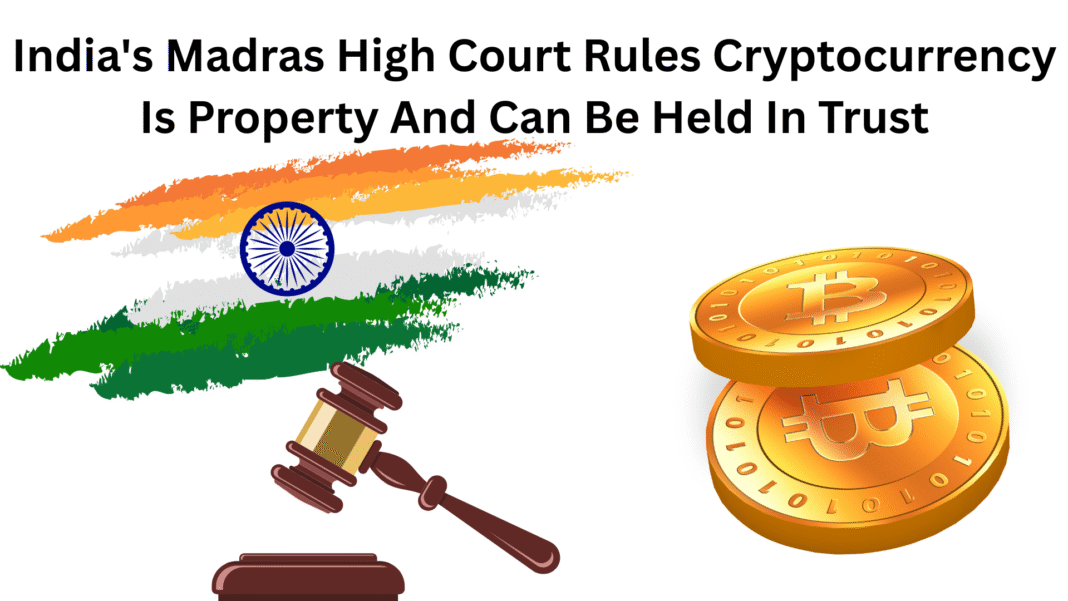On Saturday, the Madras High Court declared that, in accordance with Indian law, cryptocurrencies are considered property. This implies that it may be owned and even trusted by others.
According to Justice N. Anand Venkatesh, cryptocurrencies retain all of the essential characteristics of property even if they are neither tangible goods nor legal tender.
Crypto as a property
“There can be no doubt that ‘cryptocurrency’ is a property. It is not a tangible property, nor is it a currency. However, it is a property which is capable of being enjoyed and possessed (in a beneficial form). It is capable of being held in trust,” the Court said.
The lawsuit was brought about by a cyberattack on the WazirX exchange. In January 2024, an investor purchased 3,532.30 XRP coins for a total of Rs 1,98,516 (Approx. $2254)
WazirX disclosed in July of that year that around $230 million worth of Ethereum and ERC-20 tokens had been lost due to a breach into one of its cold wallets. All user accounts, including the investors, were frozen following the hack.
Also Read: Hong Kong, India & Australia Stock Exchanges Crack Down On “Crypto-Treasury” Listings
The investor said that WazirX held her XRP currencies in trust and that they were distinct from the stolen Ethereum tokens. To prevent the firm from redistributing her interests, she requested protection under Section 9 of the Arbitration and Conciliation Act, 1996.
In opposition, Zanmai Labs and its directors claimed that Zettai Pte Ltd, its parent business situated in Singapore, was reorganising in accordance with a Singapore court ruling requiring all users to split losses.
What does this mean?
Justice Venkatesh dismissed the reasoning put forth by Zanmai Labs. He claimed that only Ethereum-based tokens were impacted by the breach and that the applicant’s XRP currencies were unaffected.
“What were held by the applicant as crypto currencies were 3532.30 XRP coins. What were subjected to cyber attack on 18.7.2024 in the WazirX platform were ERC 20 coins, which are completely different crypto currencies not held by the applicant,” the Court observed.
According to Justice Venkatesh, cryptocurrencies constitute a kind of property as they are recognisable, transportable, and solely controlled by private keys.
He also referenced the Income Tax Act of 1961’s Section 2(47A), which acknowledges cryptocurrencies as “virtual digital assets.” According to the Court, cryptocurrency is not regarded as a speculative transaction under Indian law, but rather as a virtual digital asset.
India and Crypto
At a ceremony in Mumbai, Chief General Manager Suvendu Pati of the Reserve Bank of India stated that the central bank will begin a pilot program for deposit tokenisation. The basic layer for the test will be the wholesale portion of the RBI’s digital currency. Some banks will participate.
Also, according to Justice Venkatesh, Web3 and cryptocurrency platforms need to adhere to the same corporate governance guidelines as other companies, which include having distinct client funds, independent audits, and robust KYC and anti-money laundering procedures.
According to a government document published on 10th September, the Indian government, including the Reserve Bank of India and the finance ministry, is hesitant to enact legislation that would completely control cryptocurrencies since it may interfere with the nation’s UPI system. It’s also important to understand that India has a very stringent crypto tax regime, and thousands of traders were sent notices.
Also Read: “India Must Prepare For Stablecoins”, Finance Minister Nirmala Sitharaman Tells Global Audience


